HOW THE ISLAND GIVES


WHAT WILL YOUR LEGACY BE?
You can guide the future of your community and causes that you care about by making a legacy gift to the charity of your choice. Charitable donations help to build communities and support a wide range of causes.

APRIL 23, 2023 ADVERTISING FEATURE
Celebrating 20 years of Vital Youth
The frantic pace of high school can leave little time for extra activities. Yet, for 20 years, youth across Greater Victoria have found time in their schedules to step forward and engage with their community.
The Victoria Foundation’s Vital Youth program is celebrating 20 years. Every year, the Vital Youth Program engages dozens of students in school leadership classes or youth advisory committees in an innovative program to engage youth in community and Philanthropy.
The Victoria Foundation allocates each project team $3,000 to distribute to federally registered charities on southern Vancouver Island. Each school is also provided with an annual grant of $500 to an endowment fund in their school’s name. As these endowment funds grow, they will eventually be able to generate returns large enough to ensure a sustainable source of grant funds indefinitely.
Throughout its twenty years, students have learned firsthand about the issues in their community, how they can help, and engaged with the organizations working to leave a better tomorrow.
HOW IT BEGAN
The Vital Youth program started in 2003 and at the time was known as “Students who care: Youth in Philanthropy.” The program featured three schools (Belmont, Oak Bay and Vic High) and focused on giving students a “unique handson, hearts-on and heads-on experience.”
“We really got to see the essence of philanthropy,” said
Erinne Paisley, a past Vital Youth Participant at Reynolds Secondary School. “We all feel privileged to be part of the Vital Youth program and know that we will all continue in our own ways to be philanthropists our entire lives.”
Youth, philanthropy, and the support of a community
Starting with three schools, it took a groundswell of support to grow the Vital Youth Program. Generous donors and organizations stepped forward to support the program, helping expand the program into more schools.
One supporter of the Vital Youth Program is the Victoria Foundation Honorary Governors program, first established in 1996 during the Victoria Foundation’s 60th year of operation. Under the distinguished leadership of Jane Rogers, the group aimed to raise the Foundation’s profile, served on committees, hosted events and more. They also established the Millennium Fund which eventually focused their funding on the Vital Youth program.
The Honorary Governors developed the ‘adopt a school’ approach which increased the number of participating schools in the region. Today, you’ll find students participating across the southern island, stretching from the Saanich Peninsula to Greater Victoria and up the Malahat to Mill Bay, in 12 high schools.
The transference of power to our youth
“For a long time, I connected philanthropy to wealth. In my mind a philanthropist was a rich person who donated their money to charity,” said Wren Kerslake, a past Vital Youth participant from Victoria High School.
The Vital youth program transfers power to youth, engaging them with their community and placing funding decisions in their hands. They’re given the opportunity to reflect on the responsibility of granting through the lens of power and who holds it. They meet with organizations to learn about the critical issues in their region. They use tools like the Victoria Foundation’s annual Vital Signs Report, the United Nation’s Sustainable Development Goals and the Truth and Reconciliation Commission of Canada: Calls to Action. With the assistance of Foundation staff, youth step forward as leaders in the community, driving their own experiences with philanthropy.
It helps leave a feeling of hope and intrigue. “We have been given the knowledge that we are able to be a part of something we thought was out of our reach,” said Kreslake. “I think that the powerful thing about giving once is that it makes you feel like you can do it again.”
Vital Youth in 2023
Today, the impact of Vital Youth can be seen across Southern Vancouver Island. Nearly 700 students have participated in the program, while 347 grants have been given to local non-profit organizations totaling $400,082. And yet, the impact goes far beyond the numbers.


“Being in this program, I now understand the importance of giving back to your community,” said Mack Edwards, a past Vital Youth with Belmont Secondary.
“And when I’m 75 I’ll still be giving. You can count on it.”
ADVERTISING FEATURE 2 | ISLAND GIVING | SPRING 2023
Support the Victoria Foundation in your Will

A NEW GENERATION OF PHILANTHROPY

Meet members of the Victoria Foundation's Gadsden Initiative and learn how the program is engaging a new generation of global citizens looking to make a lasting difference in their community.



WWW.WILLPOWER.CA/CHARITIES/THE-VICTORIA-FOUNDATION/
VICTORIAFOUNDATION.BC.CA/GADSDEN-INITIATIVE/
Changing lives with nutritious food

Housing and so much more at Cool Aid
Long before anyone envisioned the idea of supportive housing, and certainly long before we were developing it here in BC, psychologist Abraham Maslow, in a 1943 paper entitled, A Theory of Human Motivation , identified a hierarchy of needs, in which physiological needs – food, water, shelter - are located at the bottom of a pyramid and selfactualization (the realization of one’s potential) is at the top. It was Maslow’s contention that unless basic physiological needs are met, someone cannot easily attend to the other levels – safety, belonging, self-esteem, and self-actualization. If someone is hungry, thirsty, and living on the streets, for example, how can they possibly be motivated to pursue their inner talents and find their potential?
This idea – that basic needs must be met before people can thrive – underpins everything that happens at the Victoria Cool Aid Society. Not only does the 55-year-old organization provide emergency shelter and permanent supportive housing in 17 locations, it also provides a range of other services – including a full-scale food service program - to ensure needs at all levels of the hierarchy are carefully considered and met. Cool Aid serves approximately 950 meals every day and over 300,000 meals each year. The organization operates two commercial kitchens – one at its
Rock Bay Landing shelter where meals are also prepared for several other locations, and one at seniors’ supportive housing site, Mount Edwards Court. Emergency shelter guests get three meals a day plus an evening snack, and all seniors’ locations, plus some supportive housing sites, get one nutritious meal each day. Cool Aid also offers food donations and a Community Kitchen program at its newly renovated Downtown Community Centre, and community meals are served there during special occasions throughout the year.
But that’s not all. As part of its effort to keep costs low, provide healthy and local food, and reduce food waste, Cool Aid - through a unique partnership with the Mustard Seed and Food Share Network - used an incredible 80,000 pounds of rescued food (valued at $250,000) last year and sourced thousands of pounds of food from local farmers and producers at a 50 percent discount through South Island Farm Hub’s innovative Farm Bucks program.
In addition to expanding food services to meet the growing need, Cool Aid plans to develop food-related social enterprises that will help to provide job skills, income, and confidence to some of its residents at two new developments – 210 Gorge Road and Crosstown (3020 Douglas Street). A coffee shop is planned for Gorge Road and the organization is planning a food
services training program and café at Crosstown.

“Food plays such an important role in the work we do here,” said Paul Stewart, Cool Aid’s food services manager. “Not only is it important for overall health and nutrition but it brings people together, gives them the chance to try new things and, most importantly, demonstrates caring.” Stewart, who is a Red Seal chef, has overseen the program and its growth since 2016, having come directly from 25 years in the restaurant industry, mostly recently as the head chef for the Harbour House Hotel on Saltspring Island.
When asked about the notable shift from high-end restaurants to Cool Aid, Stewart didn’t hesitate, “It’s the people,” he said. “We are literally changing lives by giving people the nutritious food they need to heal, and the caring that comes with cooking for them and feeding them. Some people have never had that in their lives. It’s basic but it’s so, so important.”
Donations to Cool Aid and its food services program can be made online at coolaid.org or by calling 250-383-1977.
Cool Aid creates opportunities for people who are homeless or living in poverty and makes a difference through housing and shelter, health and dental care, and support services. Founded in 1968, Cool Aid helps more than 12,000 people every year – including more than 7,000 Community Health Centre patients - at locations across the Island.
ADVERTISING FEATURE 4 | ISLAND GIVING | SPRING 2023
Chef Paul holding plate of fresh, local vegetables sourced through the South Island Farm Hub
Cool Aid’s Chef Paul displays his award winning dish - made entirely from rescued food -at the Food share Network’s AGM



Aid is Building for the Long Term You can help with a gif t in your will Cool Aid provides housing, health care, and suppor t ser vices for more than 12,0 0 0 people experiencing homelessness and living in pover t y in Greater Victoria. coolaid.org • 250. 393.1977 Cool A id ’ s new Cros stow n development w ill inc lude more t han 150 suppor t i ve and a f fordable apar t ment s , as well as commercial s pace, a communit y heal t h cent re, da ycare, and s ocial enter pr is e ca f e Cool A id s er ves approx ima tel y 950 meals ever y da y and us ed an ama z ing 80,0 0 0 pounds of res cued food last year t hrough it s food s er v ices program The Cool Aid Communit y Health Centre saw more than 45,0 0 0 patient encounters last year at its Johnson Street clinic and through health outreach.
Cool
New X-ray Room at Saanich Peninsula Hospital

In 2021 the Saanich Peninsula Hospital & Healthcare Foundation (SPHHF) asked the community to help replace the aging X-ray machine at the Saanich Peninsula Hospital (SPH). With 16 years of service the X-ray machine wasn’t just old, it was well past the end of its expected life. In addition to replacing the machine, the room needed to be brought up to modern day safety standards including replacing the aging flooring. And given the demands surrounding COVID, more than one entrance/exit was
required.
X-ray machines are one of the most important diagnostic tools in our healthcare system. SPH Medical Imaging department is constantly looking for ways to expand and improve the service that is offered to Peninsula and Gulf Island residents and to support other services such as the Surgical Services program at SPH, and the BC Cancer agency.
Thanks to generous SPHHF donors, our hospital’s X-ray room has recently been upgraded with state-of-the-art imaging technology!
The SPH Medical Radiological Technologists (MRTs) are thrilled with the enhancements. The new X-ray machine includes automated movement that allows quick positioning and rotation of



the X-ray tube to capture images horizontally, obliquely, laterally, or in free-standing positions. This speed and ease-of-use made for a considerable monthly increase in imaging.

The updated X-ray table has a large detector built-in this provides crisp images with less radiation exposure to patients. With the addition of the orthopedics component, Medical Imaging at Saanich Peninsula Hospital can now take X-rays for full spine, recumbent and standing leg length, and get even better images of weight-bearing knees and ankles. The SPH team in surgical services are delighted with these improvements!
The X-ray room also features a ceiling mounted patient lift which is helpful for positioning patients
in wheel chairs, in addition there is now space for hover mat transfers and a hallway access for patients on stretchers. This all means the SPH medical imaging team is able to provide even better care and safety for SPH patients regardless of their mobility.
From SPHHF President & CEO, Sarah Braggs, “Thanks to the upgraded X-ray room, our hospital can now offer virtually all required medical imaging locally for residents of the Peninsula and Gulf Islands, and it’s all thanks to our amazing donors!”
The Saanich Peninsula Hospital & Healthcare Foundation is grateful for the support of their donors, whose contributions have made a real difference in the health and well-being of the community.
ADVERTISING FEATURE 6 | ISLAND GIVING | SPRING 2023
L-R Kim Loucks, Site Supervisor Medical imaging, Shane Greek, Radiologist, Wendy Roberts X-ray Technologist, SPHHF Vice-Chair Chris Straub & Corilee Watters, Medical Imaging Quality & Operations Manager
Ceiling mounted patient lift which is helpful for positioning patients in wheel chairs
SPH new X-ray room
SPHHF Vice-Chair, Chris Straub demonstrates the patient ease-of use with the adjustable tabletop
SPH Medical Radiological Technologists (MRTs)



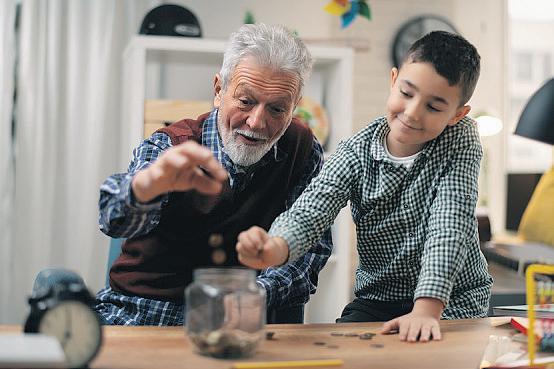
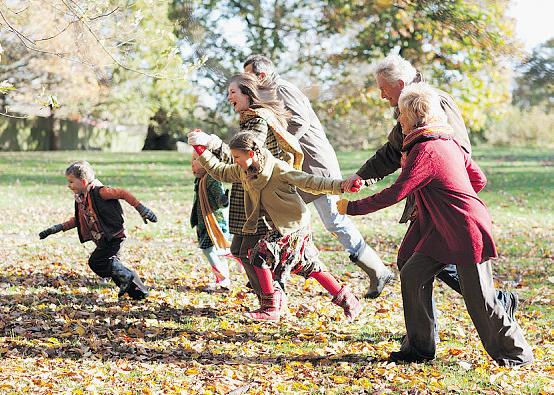

You want to have an impact on the world that your children and grandchildren will inherit. Your legacy can provide for them and your community. Visit our website or speak with your financial advisor to find out how to make a gift in your will that will leave a positive and lasting difference. MAKE Caring Your Legacy your community, your health 250-656-2948 sphf.ca Y o u r s u p p o r t w i l l e n s u r e t h a t t h e S a a n i c h P e n i n s u l a H o s p i t a l r e m a i n s a t t h e h e a r t o f c o m m u n i t y h e a l t h c a r e f o r g e n e r a t i o n s t o c o m e . Leave a gift that will last
Jamie Chung believed in helping others. This lesson and many others were passed down from her mother and car r ied her through many difficult times. I t inspired her to establish the Bett y Jamie Chung Scholarship at UVic. Today, 45 alumni can thank Jamie for paying it for ward with a gif t in her Will.
Betty Jamie Chung Scholarship Fund


While bombs rained down and devastated the war capital of Chongqing, China in 1943, a baby girl was born. Her name was Betty Jamie Chung. The Japanese had invaded China. Hundreds of people including Jamie and her mother, Mrs. Chung Lam YuanWan, were trapped inside a bomb shelter. The water supply was low and others near them were irritated by baby Jamie’s cries of hunger.
Mrs. Chung was becoming desperate when a woman kindly offered her some water for the baby’s formula. Overcome with happiness, she forgot to thank the woman properly. Immediately after feeding Jamie, Mrs. Chung sought out the woman and found her with two children of her own. The woman had given Jamie water that her own children likely needed. Mrs. Chung was so touched by the kind gesture that all she could do was hold the woman’s hands and weep. Jamie recalled her mother saying, “The mother gave us water when we needed it, water that her own children were probably deprived of because of us. How can we not help people now? It is our turn.” This belief of “giving and helping others is the best policy” influenced Jamie throughout her life.

After the war, Jamie and her family settled in Hong Kong and she attended University. In 1982, she established a market research consultant firm, which opened a new page for the Taiwan market. Later, she completed a doctorate degree in Social Psychology at The University of Victoria.

In 2010, Jamie published a book called “Life Recipes from My Mother: Timeless Lessons for Living a Contented Life” as a commemorative tribute to her mother. In the book, she shared many precious life lessons that her mother passed on to her including the story above. In Jamie’s own words, her mother made her realize who she was, what she wanted, and what she should and should not do. Armed with these ‘lessons’ and knowledge of herself, she was able to face the many challenges she encountered at different stages in her life. These lessons are about basic human values and principles, many of which she felt had been forgotten, or simply ignored in our fast-paced lives of trying to get ahead. The lessons are timeless and relevant regardless of changing times.
Jamie’s generosity continued even after her passing in 2013. She left a gift in her will to establish the endowed Betty Jamie Chung Scholarship fund at the University of Victoria, providing financial support and encouragement to more than 45 students pursuing studies in Anthropology and Psychology. These scholarships are a testament to Jamie’s belief in the power of education to create positive change in the world.
G enerosit
y is timeless.
What legac y will you leave? Find out how you can suppor t UVic students through a gif t in your Will: Greg Kuhn, Development O fficer, Legac y Giving 250-721-6001 | legac ydev@uvic ca uvic.ca/legacygiving ADVERTISING FEATURE 8 | ISLAND GIVING | SPRING 2023
(Sources: Betty Jamie Chung (2010), Life Recipes From My Mother: Timeless Lessons for Living a Contented Life; Steven Altman; the University of Hong Kong.)

















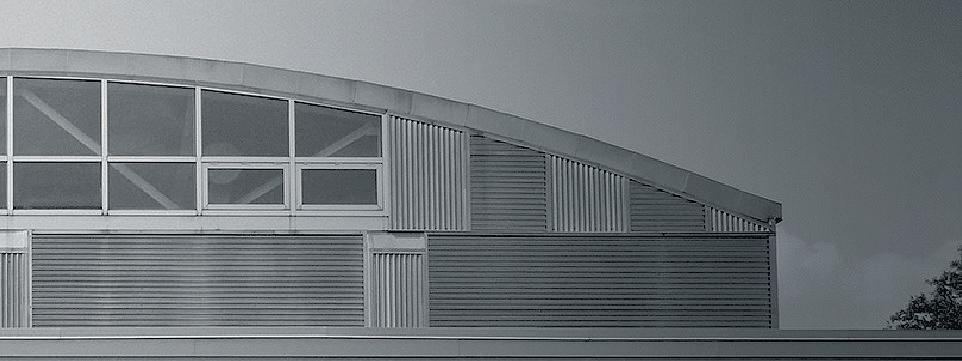






Everyone deserves a summer to remember
Many people have fond memories of summer camp—sailing on the lake, singing campfire songs, pranking counsellors, and forging lasting friendships.

Now, imagine a child who is not able to attend summer camp because of a disability, missing out on life-changing experiences and friendships. At Easter Seals Camp Shawnigan, that is not the case.
Easter Seals camps are fully inclusive and accessible, so any child or adult with a disability can attend and participate in any activity. Camp opens up a completely new world that is inclusive, fun, and accessible.
There are over 4,000 children and youth on Vancouver Island living with a physical or intellectual disability, a number that has increased by 14.6 percent since 2019. For those living with a disability, they experience a multitude of barriers in their daily life, so at Easter Seals, we are passionate about providing them with a week of no barriers, only inclusion.
Our camps have a three-to-one camper-to-staff ratio, a 24-hour medical team on-site, and camp counsellors trained specifically to work with persons with disabilities between the ages of six to 49. Disabilities vary each year from autism, development delays, anxiety disorders, Down syndrome, Cerebral Palsy, epilepsy, and ADHD, among others.
Tina and Nansey are one of many families who know just how important camp is for both the camper and the caregiver.

“Going to camp feels like coming home for Tina. It’s just a beautiful thing,” says Nansey, mother of Tina who has Cerebral Palsy and has been attending Camp Shawnigan for more than ten years. “It really is the absolute highlight of her year. She talks about it months before and for months afterwards. She has so much excitement for the whole week because she gets to celebrate life and enjoy it.”
The magic of camp happens as soon as campers arrive at the gate. A combination of training, experience, love, fun, friendship, and independence turns one week of camp into the best time of campers’ lives.
“As soon as you come through the gate to the property you feel welcome and you can just feel
the energy throughout the camp. The first time we arrived we were excited and nervous at the same time, but you leave knowing that everyone is going to have a wonderful time,” adds Nansey.
Everyone benefits emotionally and physically when they are outdoors and running around, but children and youth with disabilities are not always able to take part in sports teams or gym class, which is why summer camp can be so enriching for them.
“At Easter Seals camps, they don’t hear the word no, which is what they hear a lot of when navigating the world around them,” says Nansey. “At camp they can try any activity because it’s set up to be fully accessible and the staff are trained to work with all abilities and needs. And if a camper is nervous to try something, there is such a supportive environment to make them feel safe.”
All activities and sports at Easter Seals camps are designed for individuals with disabilities, including rope courses, climbing walls, big swings, water sports and leadership training. There are also talent shows, swimming, canoeing, campfires, arts, crafts—every activity you would see at any summer camp.

“The biggest thing camp does is give me piece of mind I can’t even describe,” says Nansey. “I am so happy that Tina has time that is just about her. It gives her an opportunity to break away from life with a disability, and her routines at home that are all about her care.”
Your support helps make stories like Tina and Nansey’s possible. And, at Easter Seals we believe in possibilities. We believe that people with disabilities can do anything when given the chance. Your support helps give them that chance.
Including a gift to Easter Seals BC & Yukon in your will, no matter how big or small, will make a lasting difference for generations to come; funding programs and services that enable children and adults with disabilities like Tina and Nansey, to flourish and thrive.

ADVERTISING FEATURE 10 | ISLAND GIVING | SPRING 2023
Contact Michelle Boileau, Senior Manager Philanthropy, at mboileau@eastersealsbcy.ca today or visit our website at www. eastersealsbcy.ca to learn more on how you can name Easter Seals BC & Yukon in your will and make a real impact in the lives of persons with disabilities in your community.
Easter Seals camps are fully inclusive and accessible, so any child or adult with a disability can attend and participate in any activity.

























Forever Guardians support animals in need of immediate care, and plan for the future of animal welfare





This sweet pup is Porter. Porter’s mom came into the care of the BC SPCA, pregnant, and Porter and her siblings were born in our care.

Our kind animal care attendants need to be ready for the unexpected. That means having the resources to provide for special medical needs or having the capacity to care for a surprise litter of puppies, or both.
Porter was extra clumsy for a puppy. Her thoughtful animal care attendants knew that something was wrong, and it was soon identified that there was a problem with her vision. She was then sent for neurological and ophthalmological diagnostics to rule out anything more serious.
While she continued to receive care, Porter moved into a comfortable foster home to receive the careful attention that she needed to thrive! We’re happy
that she will soon to be looking for a furever parent. Something that just would not have been possible without the support of kind animal lovers and Forever Guardians.
“When you become a Forever Guardian, you make lasting change for animals like Porter,” says Development Officer Clayton Norbury. “We don’t know what the future of animal welfare will look like exactly, but we do know that we all want a world without animal suffering. The caring legacy of dedicated animal lovers are the building block towards that future.”
Porter’s specialized needs were recognized and cared for because of the progress that has been made in animal welfare. That progress is possible because of Forever Guardians. Will you consider being a part of this lasting legacy of change? To learn more, visit foreverguardian.ca or contact us at foreverguardians@ spca.bc.ca or by phone at 1.855.622.7722.
ADVERTISING FEATURE 12 | ISLAND GIVING | SPRING 2023
Porter got the help she needed thanks to caring animal lovers
Better for having known him: Max
White leaves a compassionate legacy
Victoria Hospice remembers longtime volunteer

Max White and his compassionate presence. Max died on July 2, 2021. He was introduced to Victoria Hospice services when the Palliative Response Team provided support at home for his wife, Freda. After she died in 2007, he wanted to give back.


He touched the lives of countless patients, families, and staff at Victoria Hospice, volunteering on the Inpatient Unit and in Bereavement Services, supporting many programs and co-facilitating bereavement groups. Max even crafted beautiful wooden toys used in children’s play therapy sessions with the child and youth grief counsellor.
Bereavement Counsellor Betty Anderson remembers Max’s many contributions.
“His warm, calm, intelligent presence and his top-notch people skills fostered the sense of community and safe haven that are integral to a group support session,” she says. “Max’s lived
experience of being the ‘one left behind’ after a long and deep connection to a spouse ‘tuned his ear’ to be able to hear even the unspoken feelings of others in a similar situation.”
In a 2019 interview, Max reflected on his time as a volunteer.
“It was a very special experience and one in which I certainly grew as a human being, and also grew in abilities. You learn so much about people and how they can handle things and how much other people can contribute to getting you back your wholeness. It’s astounding what people do in support.”
“Hospice gives you the chance to contribute some things that you don’t even know you have.”
In addition to his legacy of compassion, Max left a gift in his Will to support patients and families at Victoria Hospice into the future. His generosity will be long remembered, and his presence greatly missed. We are grateful and better for having known him.
You don't have to choose between loved ones and charity when leaving a gift in your Will. Explore how you can support compassionate end-of-life care at Victoria Hospice Call Michelle at 250-519-1743 or visit victoriahospice.org/legacy. 1952 Bay Street | 4th Floor, Richmond Pavilion | Victoria BC | V8R 1J8 | Charitable Registration Number 11928 4230 RR0001 ADVERTISING FEATURE ISLAND GIVING | SPRING 2023 | 13
YOUNG BOY IS A WAR AMPS “CHAMP”
Eight-year-old Abel Walker was born missing the lower part of his left arm. Abel, a member of The War Amps Child Amputee (CHAMP) Program, receives financial assistance for artificial limbs and devices and also attends regional seminars where Champs and their parents learn about the latest in artificial limbs, dealing with teasing and staring, and parenting an amputee child.

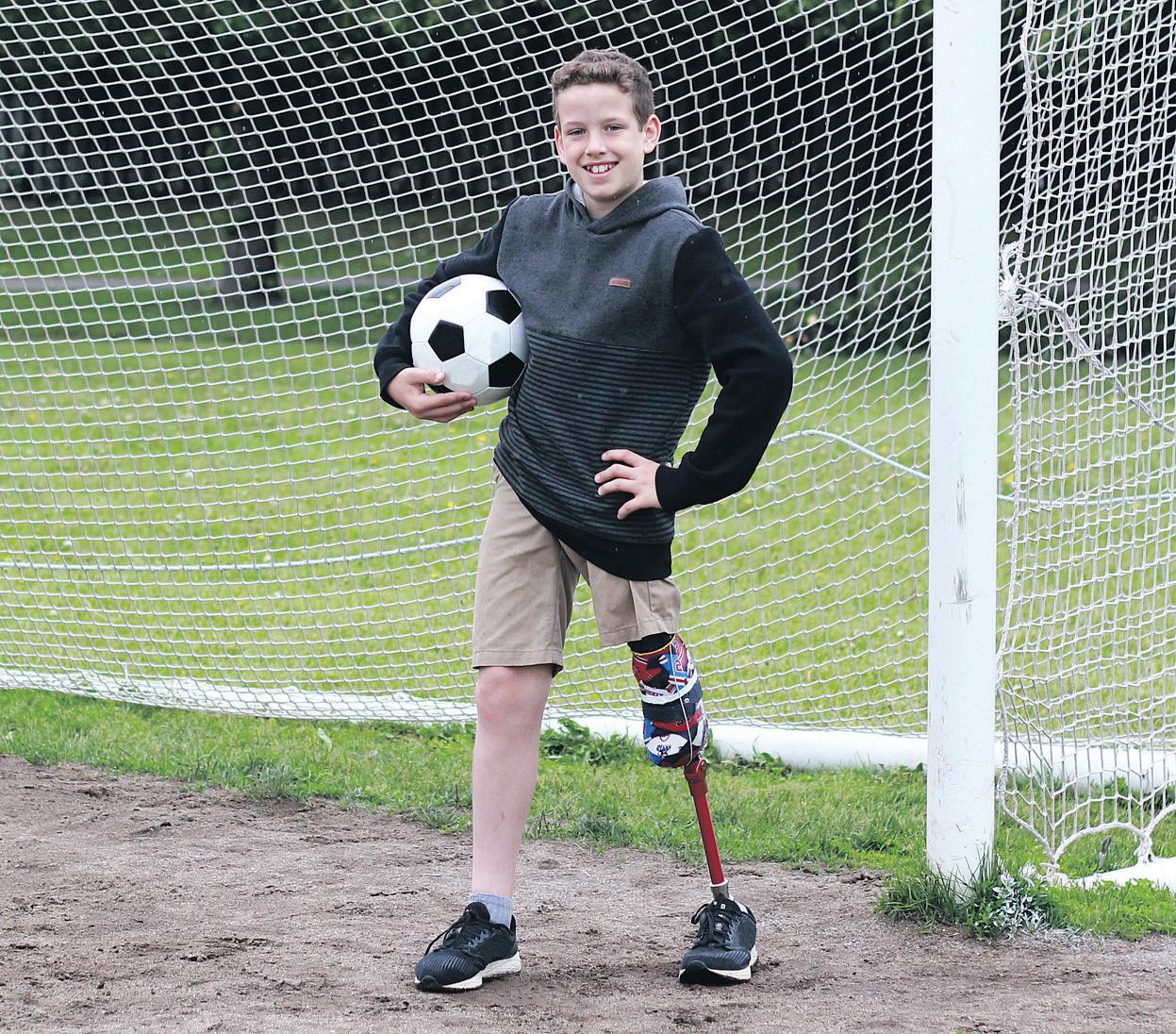
His parents Cortney and Ryan describe how The War Amps has supported their family.
“We enrolled Abel in the CHAMP Program and attended our first seminar when he was only a few weeks old. The support and strength of the CHAMP community was undeniable and truly heartwarming. We knew after that first seminar that everything was going to be OK,” say Cortney and Ryan. “As he has grown up, being a part of CHAMP has helped him feel secure in himself and his abilities. His prosthetic arm and device that
The War Amps funded allows him to do everyday tasks as well as play sports. For us, knowing that CHAMP will pay for the artificial limbs that he needs means fewer worries and that Abel can enjoy the same activities as other children.”
The Association encourages Champs to develop a positive attitude towards their amputation and try whatever activity they set their mind to. “Abel’s determination and zest for life is an inspiration to all,” said Danita Chisholm, Executive Director, CHAMP Program. “Thanks to the public’s support of The War Amps Key Tag Service, we are able to help young amputees like Abel reach their goals.”
The War Amps receives no government grants; its programs are made possible through public support of the Key Tag and Address Label Service.
For more information, or to order key tags, visit waramps.ca or call toll-free 1 800 250-3030.

Leave a lasting gift … with a charitable estate donation in your will. Your suppor t provides amputees, including children, with the essential ar tificial limbs they need to thrive. With your help, we are also a reliable source for exper tise, advocac y and peer connec tions, and our historic work for veterans continues to the present day. estatedonation@waramps.ca • waramps.ca • 1 800 465-2677 Charitable Registration No.: 13196 9628 RR0001 ADVERTISING FEATURE 14 | ISLAND GIVING | SPRING 2023
Abel Walker is a member of The War Amps Child Amputee (CHAMP) Program.
Lifetime Networks recognizes importancethe friendshipof

What will happen to my child when I am no longer here?
This is the question 5 families of adult children with intellectual disabilities asked themselves back in 1998.
Typically, people with intellectual disabilities have many paid people in their lives, including doctors, therapists, specialists and support workers; sadly there often is a lack of friends.
Making friends can be challenging for everyone. The challenge increases with the addition of barriers such as mobility issues, communication issues, physical differences ….. in fact, any perceived differences.
To answer that question, those 5 families formed Lifetime Networks. At Lifetime Networks we understand the importance of friendship as being one of the cornerstones to a fulfilling life. We create opportunities for people with disabilities and their families. We provide friendship and support services so that all people can live rich and rewarding lives in our



community – safely and with friends that care.

Lifetime Networks is a fee for service model. We strive to provide self-determination and empowerment to those we support. Some people work and pay for services, some have family assistance, some have government assistance, some people require bursaries, and many people use a combination of the above.
Lifetime Networks works diligently fundraising to provide for people who cannot afford services. It is a very lonely world without friends. Our goal is to alleviate that loneliness and assist with ‘friend raising’.
Lifetime is privileged to also have a wonderful group of volunteers who recognize the importance of friendship. We are very proud of our volunteers who in 2022 contributed 6154 volunteer hours to alleviate loneliness and build friendships.
Loneliness is a disease with terrible consequences. We invite you to work with the Lifetime Networks Family to ‘friend raise’.
Thankyou VictoriaCommunity In2023 YOU helpedusaccomplishthefollowing forthepeoplewesupport People&FamiliesServed JobPlacements 35405 NewFriendshipsCreated 124 VolunteerHours 6,154 Volunteers 167 SCAN FORMORE INFORMATION SCANTO DONATE & S UPPORT OUR WORK OurMission: Wefosternetworksoffriendshipandsupportforpeoplewith diversedisablitliestoenhancecommunity. www.lifetimenetworks.org 250-477-4112 ADVERTISING FEATURE ISLAND GIVING | SPRING 2023 | 15
Making friends can be challenging for everyone.
BY TOM ARNOLD
Liz was still working for the school board when her mother began struggling with dementia. She moved into her mother’s apartment to help provide care. But a full-time job and being a full-time caregiver quickly became more than she could manage. She retired early, and put all her energy into caring for her mom.
It wasn’t easy. There can be long wait times for respite care in Victoria. Without other family to call on, Liz’s own health suffered under the constant strain of 24/7 care duties.
In fact, she was always so busy making meals and being a de facto nurse that she stopped spending time with friends. That’s why so few people noticed when Liz started to change too.
In phone conversations, she started to forget names, and words. But always being quick with a joke, she’d poke fun at herself and move on, so her friends never thought much of it. It wasn’t until Liz herself got lost on a walk near her home that people realized something was really wrong.
Within weeks, doctors confirmed that Liz had dementia too. Friends jumped in to help where they could. It was clear, however, that neither Liz, nor her mom, could continue living on their own.
At the time, none of the publicly-subsidized care homes in Victoria had immediate vacancies. Both Liz and her mom had to settle for private options that charged between $7,000 and $8,000 a month. By the time they were able to
Did She Mismanage Her Money?
A BIG MYTH that is hurting local seniors in long-term care
As a low-income senior in long-term care, Faye reached a point where she literally had nothing to wear, and was cancelling health appointments because she didn’t want to travel across town in a hospital gown. Eldercare Foundation’s Residentin-Need program helped buy her new dresses. “I feel like I’ve moved back into the world,” says Faye.
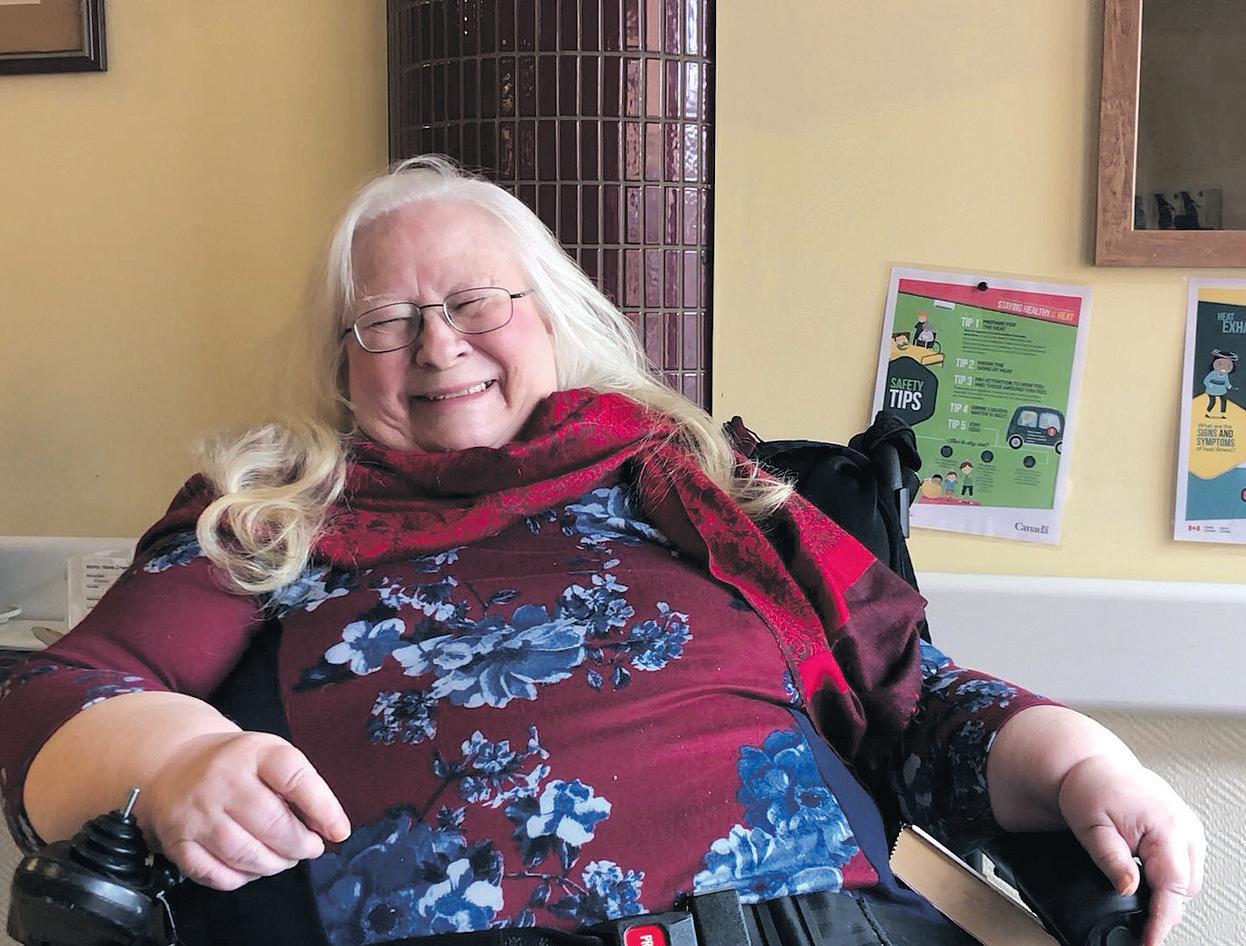
move into public long-term care, most of their savings were gone.
While Liz’s mom passed away soon after, Liz spent the last two years of her life at the Summit, a care home located at Quadra and Hillside. It’s a home supported by Eldercare Foundation, a local charity that raises funds to improve quality of life for seniors in care. Liz loved the music and art therapy sessions. Even as her dementia advanced, hearing a familiar tune or the chance to paint flowers always made her smile.
I shared this story at a public event recently, as an example of how donations can make life better for seniors in need. The reactions I received were not what you might expect.
“She worked for the school board? She must have had a big pension. Did she mismanage her money?”
“Is this who Eldercare supports? Seniors who are hiding their money to get subsidized care?”
The Boomer generation is retiring rich. That seems to be an increasingly popular sentiment encountered by Eldercare. Even though the stats tell a very different story.
It’s true that the poverty rate for Canadian seniors steadily decreased between 1970 and the mid-1990s. This was thanks to programs like the Canada Pension Plan, Old Age Security, and the Guaranteed Income Supplement. Sadly, it’s been going up ever since. A recent report by the BC Seniors Advocated found that 25% of BC Seniors live below the poverty line. That number rises to 44% when looking at single seniors like Liz.
While pension incomes have remained relatively stagnant, expenses have continued to climb. The cost for out-of-pocket medical expenses like dentures and prescription medications are now a real hardship for many. If the need for long-term care arises suddenly, many local care homes have wait times of a year or more. Private options have greater availability, but can cost $3,500 to $15,000 per month.
Even when a senior is admitted into public long-term care, the costs are set at 80% of after-tax income. This can leave many seniors unable to afford even clothes, nevermind the many other expenses not covered by the health care system.
It’s not a problem with an easy solution either. The number of seniors aged 75+ living in the Greater Victoria area will more than double in the next 15 years. There will be a lot more seniors in need in our community in the years ahead.
A good first step is not to ignore the problem, or to assume that only seniors who have made mistakes find themselves in subsidized long-term care. Many, like Liz, do all the right things. They work hard all their lives, and help support their family and friends. But they still need a helping hand to age with dignity.
Tom Arnold is Director of Development for Eldercare Foundation. Eldercare is a registered charity that supports more than 1,500 local seniors each month, both in community and in long-term care, who need help maintaining their quality of life. www.gvef.org
ADVERTISING FEATURE 16 | ISLAND GIVING | SPRING 2023

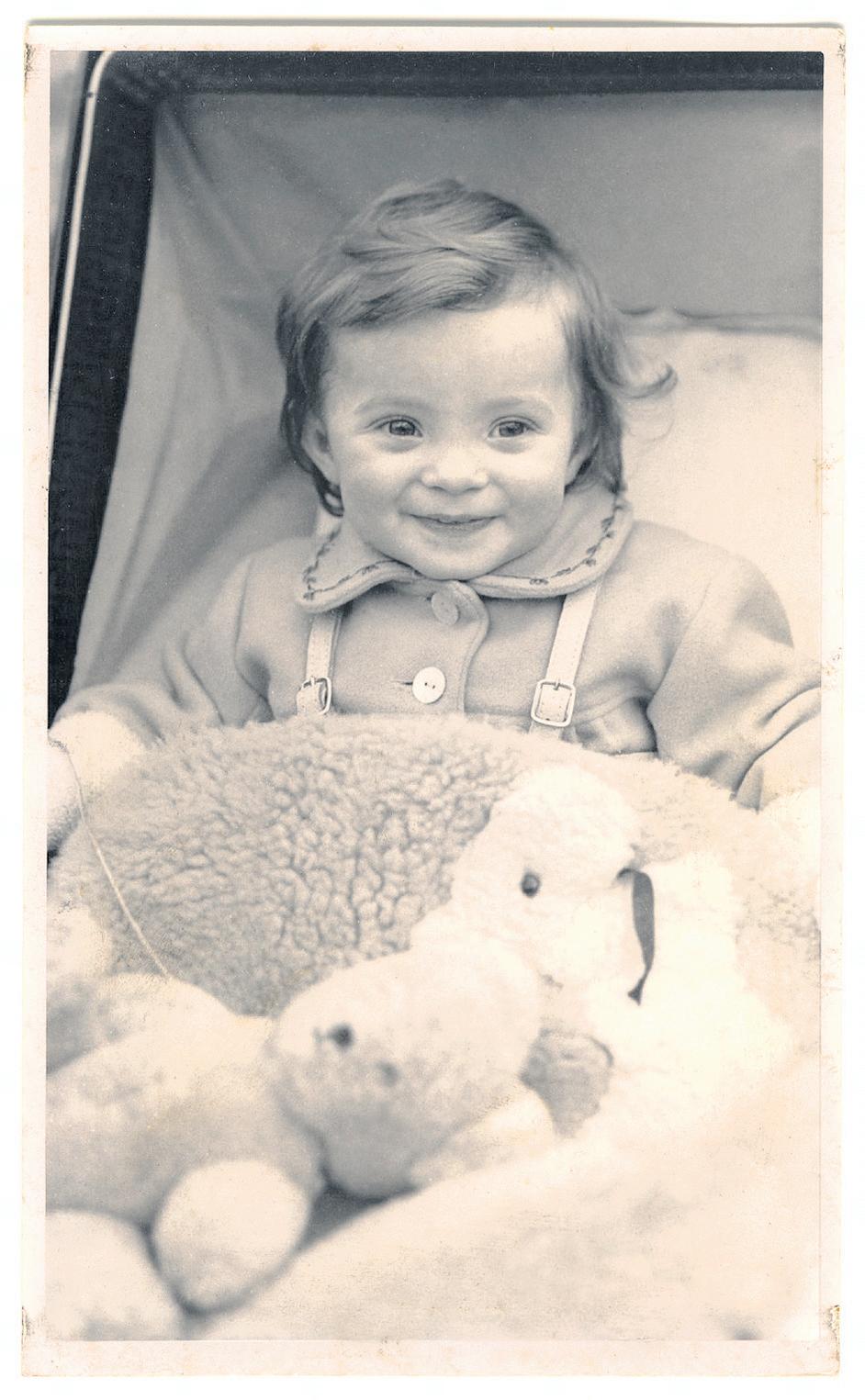






1450 Hillside Ave., Victoria, BC V8T 2B7 250-370-5664 For seniors living with dementia, life-like companion pets can enhance feelings of comfort, access to memories, and the ability to engage meaningfully with friends and loved ones. A gift in your Will can create a legacy of innovative therapies for seniors in need.
y is 82 now. Animals still bring her joy. Charity# 898816095 RR0001
M
625 Queens Avenue
Victoria, BC V8T 1L9
donors@mustardseed ca 250-953-1581
Charitable No 119246213RR0001

Join us to fight hunger
For nearly half a century, generous people in our community have been helping The Mustard Seed Street Church and Food Bank bring food to those in need. And that need has grown sharply over this last year – even more than during the pandemic.


Can you imagine having to decide whether you will eat or pay your rent or utility bill? Or how you would feel if you weren’t sure you will have food for dinner at the end of a school or work-day? Research tells us that hunger impacts every part of a person’s life. Low energy impacts their ability to focus at school or concentrate on the job. And their mental health suffers too, as worry and fear leads to anxiety and depression.
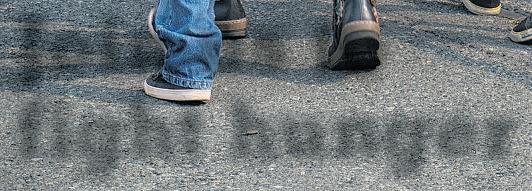
Unfortunately, these are familiar challenges for the over 45,000 food insecure people in our community. Soaring housing and food costs are putting even more pressure on families, seniors and individuals – really anyone living
on a low or fixed income. And anyone facing an unexpected cost can suddenly find themselves in serious trouble. Many of our new food bank users never thought they would need our help.

Since 1975 The Seed has been offering support to our community. We are south Vancouver Island’s largest and most accessible food bank operating five days a week, serving hot meals, distributing warm clothing, providing outpatient counselling and family supports. At our Food Security Distribution Centre, we rescue 10,000 lbs of food each weekday and redistribute it to 60+ local service organizations beyond our food bank.
Please consider giving generously to The Seed by becoming a monthly donor to sustain our operations year-round, or by including us in your will. Now more than ever, there are so many families and individuals that need your support to win the fight against hunger.

ADVERTISING FEATURE 18 | ISLAND GIVING | SPRING 2023
Turning Rare Cancer Diagnosis into a Legacy

Inspired by the care he received at BC Cancer, Larry Samuels left a generous gift in his will to the BC Cancer Foundation.
When Larry Samuels was diagnosed with undifferentiated pleomorphic sarcoma (UPS) cancer — a rare type for which there is currently no cure — he was determined to find some good that could come out of it.
He saw an opportunity and generously chose to leave a gift in his will to the BC Cancer Foundation to help fund critical research into UPS cancer at BC Cancer.
“When bad things happen, we mustn’t throw our hands down. Instead, we must ask what we can do,” Larry said, crediting his mom and dad for teaching him to find the “ray of sunshine” in even the darkest times.
His hope was that his gift would change the way UPS cancer is diagnosed and treated, so patients in the future have more options, and better outcomes.

In addition to leaving a gift in his will, Larry’s philanthropic legacy lives on in the UPS Cancer Fist Bump Fund, which he established in honour of his BC Cancer oncologist, Dr. Ronan McDermott.
“He would fist bump me at the end of all our time together. This small celebration meant everything to me,” Larry shared.
“He showed me such grace, compassion and friendship — that’s why it’s called the Fist Bump Fund.”
When asked what he would say to someone considering leaving a gift in their will to the BC Cancer Foundation, Larry said to think about where those funds can have the most impact.
“My goal from the beginning was to save a life. If I can do that, every cent will be worth it.”
[CTA] To learn more, contact Jordan McClymont at jordan. mcclymont@bccancer.bc.ca or visit bccancerfoundation.com/legacy
ADVERTISING FEATURE ISLAND GIVING | SPRING 2023 | 19
Young Larry Samuels with his mom.
Meet Elysia and her mom Rocio:
We’re all too familiar with the Covid virus, and you’ve heard of the Norwalk virus and the chicken pox virus, but have you heard of Cytomegalovirus (CMV)?
It’s a common virus that can infect almost anyone. It rarely causes any symptoms, but if you’re pregnant, it’s cause for concern.
Thirteen years ago, Qualicum mom Rocio Beaudry was pregnant and didn’t know she had the virus. However, her daughter Elysia’s health challenges have been linked to Rocio’s CMV, and Elysia will have lifelong challenges because of it.


Two weeks before her due date, Rocio’s final ultrasound showed her baby had cysts in her brain. At the time, no one knew what caused them, and no one knew what they meant for the baby’s future.
After Elysia’s birth, there were no indications anything was wrong. She was a beautiful baby girl. But a few months later, Rocio noticed Elysia wasn’t feeding properly – food was getting caught in her upper airway, and she wasn’t getting the nutrition she needed to thrive and survive.
Worried about her baby, Rocio rushed nine-month-old Elysia to Victoria General Hospital while dad Gilbert and
brother Tristen stayed home. Elysia needed a feeding tube called a J-tube and was hospitalized.
Rocio stayed at the hospital hour after hour by Elysia’s bedside. She slept on uncomfortable couches and ate out of vending machines. She went days without a shower, not wanting to leave her daughter’s side. With a child in hospital, nowhere to stay close by, and the rest of her family far away, Rocio had never felt so alone. She handled her circumstances with grace because there was no other option.
How Jeneece Place has kept this family close.
Doctors say Elysia has a cerebral palsy-like condition. At 12 years old, she is non-verbal and uses a specialized wheelchair. With her ongoing health challenges, the family has traveled to Victoria frequently, like when Elysia attended a wheelchair seating clinic at the Queen Alexandra Centre for Children’s Health; or when Elysia needed surgery to lengthen her leg tendons; or when she needs CT scans to monitor her seizures.
Although Jeneece Place wasn’t available when Elysia was born, the Beaudry family has stayed at the home frequently in the past decade and are relieved to know they
have a home away from home now, and in the future.
How Bear Essentials has changed their lives.
Bathing Elysia became more difficult as she got older, and Rocio was desperately looking for solutions to help Elysia into the bath. The family’s bathroom couldn’t accommodate a lift, nor could they afford a remodel.
So, they were overjoyed to learn of Bear Essentials, the Foundation’s family support program that assists with the costs of equipment and health-related travel for Island kids. Bear Essentials contributed to the cost of a roll-in shower so that Elysia could be wheeled inside – much to her delight.
“She loves showering. She knows that every single time she gets in her shower wheelchair, she’s going to have a shower, and she is so happy,” said Rocio.
Without government funding, Children’s Health Foundation programs are reliant on donor generosity. On behalf of Rocio and Elysia and every family that has stayed at Jeneece Place or Qwalayu House, or has been supported by our Bear Essentials program, THANK YOU for helping to provide a lifeline for Island families.
Provided by Children’s Health Foundation of Vancouver Island
ADVERTISING FEATURE 20 | ISLAND GIVING | SPRING 2023
How Jeneece Place and the Bear Essentials program have been a lifeline for this Qualicum family.



Island kid Ephraim Where there’s a Will, there’s a way… A gift in your Will is a promise today of care for tomorrow. To learn how you can support the future health of Island children, contact legacy@islandkidsfirst.com or scan
Champions for the health of every Island family since 1926.
Giving the Gift of Reading, the Gift to L ast a L ifetime!
A long tradition of providing literacy
Victoria Literacy Connection (VLC), a result of a merger between Victoria READ and Literacy Victoria Societies, continues the long tradition of providing literacy support on the South Island. VLC addresses community and individual needs by providing programs through a learnercentered approach, whether it be reading, writing, math, school support, English and French languages and digital literacy. An example of adapting to community needs, VLC developed an online reading program for children in grades 2-5 in groups of three facilitated by trained volunteers already Easter Monday 2020. Accordingly, VLC adapted its remaining programming to online learning in parallel to in-person learning. With online learning, we soon discovered how beneficial this was for single parent households and individuals with mobility and transportation issues. To balance out the technology, VLC developed an intergenerational pen pal club, where elders and youth exchange letters, which created lovely and sincere connections in our community.
VLC has recently started a Family Literacy program where preschoolers and their newcomer


parents and grandparents take part in intergenerational reading support to improve English language skills and to encourage reading in the home. Such a delight to see the little ones! Presently, VLC is developing financial literacy for youth and adults and a youth critical thinking program where youth will learn research skills, understanding about reliable sources and presentation skills.

SOME TESTIMONIALS:
“Highly recommend. No matter what your level of experience is, it has been a great reintroduction to building computer skills.”
“The program delivered by my [adult literacy] tutor was excellent. Thanks.”
“We are so very grateful that this program is available, J. has come so far thanks to this extra help, I would love for you all to know what a godsend this is for kids that are struggling, as we all know, it affects their confidence and how they view themselves …. Thank you!!”
Visit victorialiteracyconnection.ca to learn more or contact our Executive Director, Christine Bossi, by email: ed@ victorialiteracyconnection.ca or phone: 250-385-0014, who will be very happy to discuss your gift giving arrangement to suit your preferences.

Visit w w w.victorialiteracyconnection.c a to learn more or contact our executive director Christine B
by
victorialiteracyconnection.c a or phone: 250-385-0014
ossi
email: ed@
ADVERTISING FEATURE 22 | ISLAND GIVING | SPRING 2023
If doors could talk

It’s not every day that you read a letter from a door, right?
There’s that expression – if walls could speak, oh the stories they would tell! – well… I’ve got stories too!
I’ve been a part of The Cridge Centre since the beginning. I welcomed Edward and Mary Cridge during the construction of our building in 1891. I opened to receive the first children and staff who stayed here. I watched our community grow from Fort Victoria to the city we are today. I was here when we transitioned from being an orphanage to being a multi-service organization that serves over 2400 people a year.
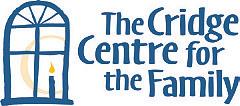

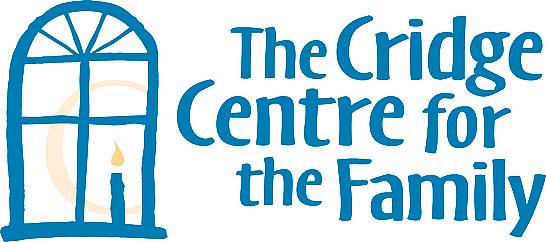
I’ve seen the broken hearted limp through our door, I’ve seen the passion and commitment of people determined to make this world a better place.

You could say that I’ve seen it all!
What a legacy of care in our community! Truly we are restoring hope and building community –every day for 150 years!

Now THAT is something to get excited about!
You could be an important part of that legacy of care – your support can make so many things possible! Have you considered making a donation that will make an impact on our community for the next 150 years?
I’ve welcomed people just like you who made a life-changing, life-giving gift. Will you be next?
My friend, Joanne, would be happy to chat with you about how your gift can continue to restore hope and build our community. 250 995 6419 or jlinka@cridge.org
To donate: cridge.org/donate Call: 250 995 6427 Mail a cheque to: The Cridge Centre for the Family, 1307 Hillside Ave, Victoria BC, V8T 0A2 You can make a difference in your community! Be a part of our legacy – 150 years of restoring hope and building community. ing Give a life-changing donation that will impact the next 150 years of community care. ty ADVERTISING FEATURE ISLAND GIVING | SPRING 2023 | 23
Celebrating 150 years, Doris (the door)
Doris, Taylor building
United for Mental Health
Give to United Way today to help youth struggling with mental health
From boomers to Gen Z, few adults remember their tween and teen years as being totally smooth sailing. At the time, much of life seems bafflingly new, changeable, or stressful. Coping with dramatic changes to your body is tough enough, let alone navigating complex social rules at school or trying to land your first part-time job.
For some youth on Southern Vancouver Island, there’s an additional worry: dealing with mental health challenges.
Zoë Newson, a staff member at Mental Health Recovery Partners (MHRP) - South Island, views her own first-hand experience with mental health challenges as an invaluable way to connect with those she now supports in her role as a peer support manager.
As a mental health care professional with more than 12 years of personal lived experience, Newson knows that peer support can have a meaningful impact on youth who are struggling with mental health. “Someone shared with me the idea that if you’re not able to find hope in yourself, you can find somebody who can hold that hope for you,” she says.
Offering hope, an empathetic presence, and a safe space for kids in the community who need it most is a necessity on Southern Vancouver Island. Incidences of youth dealing with mental health challenges have become more obvious in recent years, accelerated in part by factors like the COVID-19 pandemic.
Locally, one in three residents face worse or much worse mental health, compared to pre-pandemic times, and youth are at higher risk, reporting significant anxiety, depression, and stress. The World
Health Organization describes the situation as a growing crisis in mental health.
Recognizing the seriousness of the crisis here in our own community, this spring the United Way Southern Vancouver Island (UWSVI) launched the United for Mental Health campaign to support local youth to get the help they need.
As of April 6, the community has raised a total of $29,670 through the United for Mental Health campaign. The donations will go to a network of community partners who provide crucial mental health services such as counselling, crisis support, and mental health education.
UWSVI gives special thanks to Island Savings, its campaign corporate partner, for matching individual donations, dollar-fordollar, to a total of $10,000.
These donations will support local programs and services like MHRP’s in-house peer support programs, so mental health professionals like Newson can help youth whom she says are saying, “Hey, I would really benefit with connecting with somebody who has lived experience and getting emotional and practical support.”
Not only does United Way funding allow agencies to continue (and grow) established programs; it also frees them up to develop new approaches. For example, MHRP is helping youth navigate the vast constellation of resources and programs related to mental health, using tools that youth find useful. Pointing to a QR code on her key fob, Newson explains
that it leads users to a landing page with a host of practical links.
MHRP is only one of the local agencies that will benefit from the infusion of support. As with all its campaigns, United Way funds and supports a network of agencies in the community that deliver programs and services to those in need. Donor dollars are spread across diverse projects, agencies, and organizations—some with very targeted approaches and client bases—to maximize the overall impact and build capacity.
Donations provide immediate support to much-needed resources. And as Erika Stenson, Executive Director of UWSVI, notes, “The longterm impacts of these donations are significant, even exponential. Donors support programs that in turn support youth, giving them access to the resources and support they need to live happy, healthy lives for decades to come.”
Stenson says that the United Way believes mental health is just as important as one’s physical, social, or economic health, and plays a critical role in building stronger communities.
UWSVI encourages people throughout Southern Vancouver Island to spread the word about the need to support youth with mental health challenges and to make a donation.
The United for Mental Health campaign ends on June 1, 2023, but there’s still time to give. Visit uwsvi.ca/unitedformentalhealth to learn more or to donate.
ADVERTISING FEATURE 24 | ISLAND GIVING | SPRING 2023
Souther n Vancouver Island
United for Mental Health
Every donation made to the United for Mental Health campaign ensures that a network of frontline agencies in our community has the resources to support young people who are struggling with mental health challenges.

Together, we can make a difference in the lives of these youth.
Join our United for Mental Health campaign today to help create a healthier, more resilient community. DONATE

TODAY uwsvi.ca
3 ways to re duce estate taxes and avoid unintende d complic ations
Recently, Broadmead Care B oard Member B ob shared with us a stor y about the executor of a dear friend’s estate. Here are some of the things he learned:
1. Our friend, who knew she was approaching death, chose to leave her house to a relative. By not transferring title before death, more than $15,000 of probate fees were levied on her principal residence. Transferring title before death could have avoided this.
2. There were more than twenty beneficiaries on two continents named in the will. Each needed to be located and provide confirmations to the estate Until they did, no bequests could be distributed. Since the neighbour continued to be of sound mind, making payments shortly before her death instead of leaving bequests in her Will would have further reduced probate, executor, and legal fees It would also have shortened how long it took to wrap up the estate.
3. B eing co-executors meant both B ob and his wife had to be present for all official meetings regarding the Will. This wasn’t much of a problem for them, but it could be difficult where coexecutors work or live in different cities or provinces. Naming a single, local executor can simplif y the process.
B ob says they learned a lot about how to manage their own estate as they worked through that of their neighbour. He hopes describing these pitfalls might be helpful to others when considering their estate planning and, with professional advice, perhaps avoid unintended complications in their own Wills.
While we ’ re not experts, we have seen firsthand how charitable donations can help offset estate taxes. We have been the ver y grateful recipient of legacy donations that will help us protect the future for Canada’s veterans, seniors, and adults with disabilities who live in Broadmead Care Homes.

Help love, life, and living matter ... forever. You can take care of your family and make a difference for the people who live and work at Broadmead Care. Just 1% of your estate can be your legacy of compassion and care ... forever.
Broadmead Care Society is a registered charity. #129290383 RR0001 How do you want to be remembered? Lear n more at www.broadmeadcare.com/legacy-giving-at-broadmead-care or call Mandy at 250.658.3226 for a confidential conversation. BECKLEY
I HARRIET HOUSE | NIGEL HOUSE | REST HAVEN LODGE VETERANS HEALTH CENTRE | VETERANS MEMORIAL LODGE 4579 Chatterton Way V ctoria, BC V8X 4Y7
The information in this news post is not legal or financial advice. Broadmead Care encourages donors to contact their professional advisors when considering a legacy gift
FARM LODGE
Husband Honours Victor ia Ho spitals in Memor y of Lov ing Wife

When Ernie Smyth remembers his wife Peggy, his face lights up at the thought of her smile and her big hear t. “She was a wonderful person. Not at all selfish,” he says. “She suppor ted me in ever ything. Peggy was just happy.”

Married for an extraordinar y 62 years, Victoria Hospital Foundation donors, Ernie and Peggy, met when they were just 19 and later immigrated to Canada from Ireland. They raised two sons and spent the last 30 years together on Vancouver Island. What is the key to a long and happy marriage such as theirs? “Respect for each other,” Ernie says, “and to enjoy each other ’s company.”
Sadly, Peggy passed away at Royal Jubilee Hospital in 2017. Thanks to the understanding and compassionate care of the hospital staff, Ernie made a generous gift to Roy al Jubilee Hospital in her memory. Today, a painting and a plaque hangs in a sunroom of the hospital’s Patient Care Centre in her honour.
Peggy and Ernie
More recently, Ernie decided to give another significant gift in suppor t of the brilliant work of our hospitals’ care teams.
“We should all give back,” shares Ernie. “I have a wonderful life, and it makes me feel good to give, and it makes my family feel good. That’s what my wife would have wanted to do. When you talk about life, it’s nice to give it back.”
I have the privledge of working with donors like Ernie ever y day. And each day I continue to be amazed by the generosity of our community and the touching stories of compassion and dedication that emerge from our hospitals. It’s a ver y moving experience to help steward gifts of all sizes to ever y area of care within Royal Jubilee, Victoria General and Gorge Road hospitals
If you have a desire to leave a lasting impact on local healthcare by including the Victoria Hospitals Foundation in your will, or want to donate in tribute of a loved one, please reach out and let’s go for coffee. I’d love to hear your stor y.”
—Beth Cairns
Leadership & Legacy Giving Manager, Victoria Hospitals Foundation







250-519-1750 victoriahf.ca /will BY EMAIL BY PHONE ONLINE vhf@islandhealth.ca
Find the right volunteer opportunity for you
Giving back to one’s community can provide a sense of purpose and improve an individual’s overall well-being. Data from Volunteer Hub indicates that people who volunteer improve their health by strengthening their bodies, improving their moods and reducing stress. Volunteerism also produces additional benefits, including boosting one’s positive perception to others. A study from CareerBuilder found 60 percent of hiring managers see volunteerism as a valuable asset when making recruitment decisions. Furthermore, human resources executives attest that contributing to a nonprofit can improve leadership skills. By understanding the value behind volunteer workfor the people or organization on the receiving end as well as the volunteer - more individuals may decide to donate their time and services. However, finding the right volunteer opportunity may take some trial and error. The following are some tips for finding the right fit.
· CONSIDER SKILLS AND INTERESTS: Before choosing a volunteer opportunity, make a list of activities that you enjoy. This may help guide volunteer choices. For example, if you like hiking, you may volunteer to clean up a local park.

· ASSESS YOUR SKILL LEVELS: Is there something you are particularly adept at doing? For example, if you










are a certified public accountant, you may be able to volunteer by mentoring young accounting students, or doing taxes or bookkeeping tasks for the elderly or less fortunate.
· Think about commitment level. Figure out how much time you can spend volunteering. Maybe you only have the weekends or a few hours in the evenings? Understanding how much free time you have can help you choose opportunities that fit within these parameters.
· RESEARCH POTENTIAL ORGANIZATIONS: Not all nonprofit groups are created equal. Utilize resources such as CreativeVolunteer that vet charitable groups to determine if they are trustworthy.
· DEFINE YOUR GOALS: Have goals in mind when selecting opportunities. Defining a goal can help you maintain the motivation to volunteer and see a project through to completion.
· START SMALL: Wade into a volunteer opportunity slowly to see if it is the right fit. This may include volunteering one day a week or month. Increase the time you spend volunteering once you’ve found the right place for you.
Volunteering can bring joy to a person’s life, especially when individuals find an inspiring opportunity.


 GB22B436
GB22B436


























































































































































 GB22B436
GB22B436
















